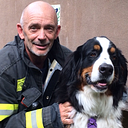What is the Future of Animal Shelters? A Future “Perfect” Notion
Alan Kay, one of the parents of the modern laptop computer, wrote, “The best way to predict the future is to invent it.”
In that spirit, this column is about the future of animal shelters. I’ve gathered together a “panel” of visionaries: Bridget Lindquist, the Executive Director of the Española Humane Society, Murad Kirdar, the Española Shelter Director of Community Engagement, and Dylan Moore, the Senior Director of Shelter Operations at the Santa Fe Humane Society.
I asked them, “In a perfect world, what is your vision of animal shelters in twenty years?” Or, in other words, “what are you striving to invent?” (I know we don’t live in a perfect world, but starting with an ideal vision of what it could be is essential!)
To begin, the consensus is that today, shelters, a place to “house” unwanted animals, are necessary. And it is important to understand they are also a traumatic experience for animals. To illustrate the scope of shelter reality, Española Shelter took in 4343 unwanted or abandoned animals in 2023. Worse, nationally, over 56% of dogs taken in by shelters are euthanized, according to Petkeen.com. Many of those dogs are adoptable, with no health or behavioral problems. In my view, all of this is a four-alarm fire that we must strive to extinguish.
Given this, what does that perfect future look like? Dylan said, “The perfect future is where shelters no longer exist because there are no unwanted animals.” Before you roll your eyes, note that history is littered with individuals claiming something is impossible right before it becomes part of daily life. (think “talking movies,” airplanes, space flight and computers)
Here are some steps we, as a community, can take to get closer to the dream.
1. Create a vibrant foster community where unwanted dogs can stay in a home rather than a shelter until adoption. (We need foster guardians!)
2. The focus of shelters becomes not housing animals but helping animal guardians keep their pets at home: providing food, if necessary, medical care, and understanding. Bridget Lindquist said that behind every broken animal is often a broken person. The emerging role of shelters is to help that relationship so that a pet can stay home.
2. Trumpet the message that adopting dogs rather than “buying” dogs benefits everyone (dogs and humans). The shelters are full of amazing animals.
3. Spay and neutering becomes the gold standard. An unspayed female dog can have up to three litters a year. At seven puppies per litter over six years (And her puppies having puppies), that’s over 65,000 new dogs. (same with cats) Ideally, spay and neutering would be free or subsidized. In the long run, it will save money and heartache.
4. Educate, educate, educate. Shelters become community resource centers (like community colleges) where individuals can get advice, training, and support.
5. Ideally, shelters are redesigned to be easier and less traumatic spaces for the hopefully fewer animals that need to be housed.
How can we help get us to this perfect future? First, it takes consistent funding. Shelter funding closely follows the health of the economy. Unfortunately, animal surrenders also follow the economy, but inversely. The worse the economy is doing; the more pets get surrendered. For animal advocates, this means pressuring our representatives to keep animal welfare top of mind.
As important, we must continue the cultural shift, the paradigm change about animals. If we do, in twenty years, it will be unacceptable to mistreat animals, to allow dogs to sit in kennels for months on end, or to euthanize healthy animals.
It might seem like a impossible change. But think about how our culture has changed its beliefs about cars and safety. Growing up in a family of six, I was often assigned the seat-of-death: Facing backward in the last row of a station wagon without seatbelts. That would be considered child abuse today. We can make significant changes — it just takes time, the passionate voices of a few, and a culture that says, “Enough is enough.”
We are headed in the right direction and have work to do.
A final thought. Mahatma Gandhi wrote, “The greatness of a nation can be judged by the way its animals are treated.”
Let’s join the revolution! Let’s envision a great future without shelters (but lots of pet community centers)
Hersch’s latest book, “Dog Lessons: Learning the Important Stuff from Our Best Friends,” is available at bookstores and online.
